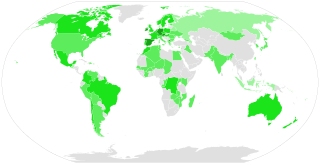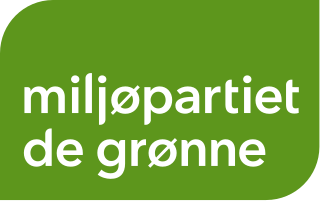
Alliance 90/The Greens, often simply referred to as the Greens, is a green political party in Germany. It was formed in 1993 by the merger of The Greens and Alliance 90. The Greens had itself merged with the East German Green Party after German reunification in 1990.
In politics, a red–green alliance or red–green coalition is an alliance of "red" parties with "green" parties. The alliance is often based on common left political views, especially a shared distrust of corporate or capitalist institutions. While the "red" social-democratic parties tend to focus on the effects of capitalism on the working class, the "green" environmentalist parties tend to focus on the environmental effects of capitalism.

A green party is a formally organized political party based on the principles of green politics, such as social justice, environmentalism and nonviolence.

The Greens was a centre-left to left-wing green-ecologist political party in France. The Greens had been in existence since 1984, but their spiritual roots could be traced as far back as René Dumont's candidacy for the presidency in 1974. On 13 November 2010, The Greens merged with Europe Ecology to become Europe Ecology – The Greens.
The Coalition of Progressive Electors (COPE) is a municipal political party in the Canadian city of Vancouver, British Columbia. It has traditionally been associated with tenants, environmentalists, and the labour movement. COPE is generally guided by democratic socialist principles following the split of its social democratic wing in 2014 to form OneCity Vancouver, and has a long history of advocating for issues such as improving public transit and investing in affordable housing. It last held a majority government on city council from 2002 to 2005. COPE describes itself as being committed to renter protections, ending homelessness, taxing the rich to build social housing, safe supply, free transit, Indigenous reconciliation, climate action, and other social and environmental reforms.
The Green Party of Aotearoa New Zealand, commonly known as the Greens, is a green and left-wing political party in New Zealand. Like many green parties around the world, it has four pillars. The party's ideology combines environmentalism with left-wing and social-democratic economic policies, including well-funded and locally controlled public services within the confines of a steady-state economy. Internationally, it is affiliated with the Global Greens.

The Greens is a political party in the Netherlands. It advocates for Green politics, an unconditional basic income and emphasises its anti-militarism.

The European Green Party (EGP), also referred to as European Greens, is the European political party that represents national parties from across Europe who share Green values. The European Greens works closely with the Greens–European Free Alliance (Greens/EFA) parliamentary group in the European parliament which is formed by elected Green party members along with the European Free Alliance, European Pirate Party and Volt Europa. The European Greens' partners include its youth wing the Federation of Young European Greens (FYEG), the Green European Foundation (GEF) and the Global Greens family.

The Values Party was a New Zealand political party. It is considered the world's first national-level environmentalist party, pre-dating the use of "Green" as a political label. It was established in May 1972 at Victoria University of Wellington. Its first leader was Tony Brunt, and Geoff Neill, the party's candidate in the Dunedin North electorate, became the Deputy Leader.

The Federation of the Greens, frequently referred to as Greens (Verdi), was a green political party in Italy. It was formed in 1990 by the merger of the Federation of Green Lists and the Rainbow Greens.

The Green Party is a centre-left green political party in Norway. The party holds three seats in the Parliament of Norway and also has representation in municipal councils and county councils.

The Political Party of Radicals was a Christian-radical, progressive Christian and green political party in the Netherlands. The PPR played a relatively small role in Dutch politics and merged with other left-wing parties to form GreenLeft in 1991.

Young Greens is a youth political organisation in Ireland that acts as the youth branch of the Green Party and the Green Party in Northern Ireland. As a youth party they focus on issues that affect young people including access to education, affordable housing, drug policy, LGBTQI+ rights and reproductive rights.The Young Greens believe in social and economic justice for all as well as environmental sustainability for the future.

The Greens are a green and regionalist political party active in South Tyrol, northern Italy. Once the provincial section of the Federation of the Greens, the party is now autonomous and often forms different alliances at the country-level, but both joined Green Europe, a coalition of green parties for the 2019 European Parliament election, and the Greens and Left Alliance, a coalition with Italian Left for the 2022 general election.
The Ecologists, formerly known as Europe Ecology – The Greens is a centre-left to left-wing green political party in France. The party is a member of the European Green Party. The party was formed on 13 November 2010 from the merger of The Greens and Europe Ecology.
Red–red–green coalition, alternatively "red–green–red" or "green–red–red", refers to a left-wing political alliance of two "red" social democratic, socialist, or communist parties with one "green" environmentalist party.

Angelo Bonelli is an Italian politician. He is the spokesperson of Green Europe.
Stephen Laurence Rainbow is a former New Zealand politician. He is manager of Auckland Transport's key relationships unit.
The Teal Deal is a hypothetical blue–green political alliance between the Green Party of Aotearoa New Zealand and the New Zealand National Party. The term Teal Deal is a reference to the medium blue-green colour teal, which combines the political colours that represent the two parties.













